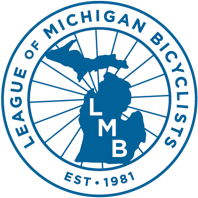
On June 7, Gov. Whitmer signed HB 4250, 4251, and 4252, and changed the law in the state of Michigan. It is now illegal to hold a phone while driving in Michigan. Distracted driving is one of the biggest threats to the safety of people who bike and walk, and while these laws won’t eliminate it (speed limits don’t prevent all speeding) we know they’ve been very effective in other states.
The signing ceremony was held outside the Mitchel Kiefer Memorial Rink at the USA Hockey Arena in Plymouth. Mitchel’s father, Steve Kiefer, has testified about the grief of losing his son to a crash caused by a distracted driver, and the determination he’s felt to end distracted driving through the Kiefer Foundation (a sponsor of LMB – see back cover.) Steve acknowledged the many advocates of both parties who have been part of the push to see these bills become law over the last four years, including former representative Mari Manoogian (LMB’s Representative of the Year last year) and current representatives Matt Koleszar (D-Plymouth), Tyrone Carter (D-Detroit) and Mike Mueller (R-Linden.)
After remarks by Rep. Koleszar; Lisa Lunsford, chair of MICHauto; Brad Wieferich, director of MDOT; and Gov. Whitmer, the governor sat down, picked up a pen, and signed the bills.
And at that moment, they became law.
It was a powerful moment. LMB fought for four years to see these laws put in place and make it clear that distracted driving puts lives in danger. Driving phone-free is the best way to ensure you’re giving 100% of your attention to the task of driving, 100% of the time. Your own safety and the safety of everyone around you depends on it. Shifting the culture in our state is a big task, but together we can do it.
We’re especially proud of LMB’s success in strengthening the law, advocating to add the word “hold” to the key phrase “an individual shall not hold or use a mobile electronic device…” in the bill introduced earlier this year.
After the signing ceremony, MDOT Director of Communications Jeff Cranson invited us to join their Talking Michigan Transportation podcast to talk about the impact of the new law and what we’re doing. The following is an excerpt of the show transcript, edited for length; find the episode at LMB.org/TMTpodcast.
Jeff Cranson, MDOT:
Last week, Michigan Governor Gretchen Whitmer signed legislation that bans the use of handheld electronic devices while driving. The legislation had a number of advocates, none more so than the League of Michigan Bicyclists. Here today to talk about why his members worked so hard to get these bills over the finish line is Matt Penniman, Director of Communications. Talk about what the bills mean to you and your members and how you think they’ll help.
Matt Penniman, LMB:
We’ve seen a lot of folks decide to switch from riding on roads to riding on trails precisely because of the distracted driving issue. Bicyclists are more vulnerable to distracted drivers, and also more aware of distracted drivers, because we’re right at the height where we can see when people are on their phones when they’re driving.
It’s unfortunately too common. We really want drivers to put their phones away and drive phone free as much as possible. If you need to use it for navigation, put it in a dash mount, but as much as possible — break free from your phones when you’re behind the wheel and give 100% of your attention to the task of driving 100% of the time.
We’re really glad that these laws have passed. The National Transportation Safety Board advises states to go even farther and to ban phone use in cars entirely, including hands-free, because there is a cognitive distraction element too, even when you’re using it hands-free.
Some of what you heard from opponents is that, well, this won’t really make a dent anyway. And then you turn around and say to them: so, are you saying that we should just ban phone use altogether? And they’re like, “Well, no, no, I’m not necessarily saying that.” So how do you reconcile that?
This does take a step forward, in the right direction. It starts to shift the culture, and make people think, “Hey, maybe I shouldn’t be doing this in the car.” We know from other states that have passed these kind of laws: they make a difference. There was a study that looked at Oregon, Washington and California and their laws, and found they really did reduce rear-end crashes in the states that had a good, strong law without loopholes – like Michigan’s law. Michigan’s law is pretty strong.
In Ohio there was a 9% decline in distracted driving, as counted by screen time, in the wake of the bills passing. I’m hoping we see something similar in Michigan, but you can’t expect police to catch everybody doing this. What do you think should be the goal?
It’s got to be a culture change. Right now, you would be shocked if you were in a car with a friend and they cracked open a can of beer and were holding an alcoholic beverage while they were driving. I want to get us to the same place with phones,
where you would be shocked if you called your friend and they picked up and said, “Oh yeah, I’m driving.” You should feel – and they should feel – “Wait, this is not okay. This is a breach of the social contract. I should not be on a call or texting or otherwise messing with my phone while I’m driving.”
That would be quite an achievement.
I think it’s going to take a while to get there.
What else are you guys working on? What are your hopes and dreams for future legislation or public outreach?
One piece we’re looking at is the data gathering question: what makes sense for getting a better handle on the current state of our non-motorized network? Another is Complete Streets. MDOT has a Complete Streets policy that was passed by the State Transportation Commission back in 2012. I haven’t seen any updates or reviews since then.
Maybe it’s a good time — since FHWA has come out with new guidance on Complete Streets, including a report to Congress — to revisit that, and to encourage communities across the state to look at their Complete Streets policies and make sure they’re doing everything they need to. There’s a lot of resources now on Complete Streets that didn’t exist a few years ago. If folks have a policy that’s been sitting on the shelf, they may not realize there are new opportunities in federal funding, or design guidance for more effective ways to do bike infrastructure.
It’s a promising time. I think there’s a lot that we can do together, and I’m hopeful that, as we see the EV transition go ahead, we can also see a multimodal transition that enables more folks to make the choices that work best for them and have those choices be safe.
You make a good point about the Complete Streets policy and a need to be constantly looking at it and thinking about the evolution. Maybe it is time to take another look, because a lot has changed. What, in the simplest form, would you look at?
I would look at Smart Growth America, which every year recognizes the best complete streets policies across the country and has offered a framework for rating those policies for their effectiveness. Does our statewide policy hit all those boxes? Do we have a model policy to propose to communities that would hit all those boxes? Questions like equity: does this serve all the communities that have been historically disadvantaged? Implementation: does this policy let us track our success over time? Does it let us measure how close we are to completion or to where we want to be? Those are some things that may not be intuitive, and having a strong model policy might help communities look at their Complete Streets policy and say, “Oh, this is a simple way we could improve it and make sure we’re doing the right things.”
I think you’re right, we should always be looking at those things. One of the challenges you have to keep in mind is that the different people that were brought together to finally get some consensus on this all define success differently, and that’s what can make this so challenging.
Sure, but I do think it helps to define success publicly, so that your constituents can hold you accountable for whether you’re setting the right definition and whether you’re meeting your own definition of success.

Categorised in: Uncategorized
